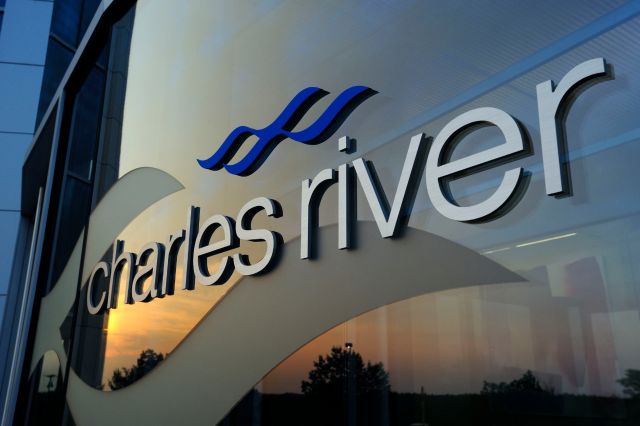| View printer-friendly version |
Scientific Consortium Awarded Knockout Mouse Project Grant from the National Institutes of Health
- UC Davis, TCP, CHORI and Charles River Form DTCC Scientific Consortium -
WILMINGTON, Mass., Sep 29, 2011 (BUSINESS WIRE) -- Charles River Laboratories International, Inc. (NYSE: CRL) announced today that the DTCC, a consortium formed by the University of California Davis (UC Davis), Toronto Centre for Phenogenomics (TCP), Children's Hospital Oakland Research Institute (CHORI) and Charles River, was awarded grants for $34 million over a five-year period from the National Institutes of Health (NIH) to participate in the second phase of the Knockout Mouse Project (KOMP).
The scientific and industry thought leaders partnering in the consortium include K.C. Kent Lloyd, D.V.M., Ph.D., UC Davis; Colin McKerlie, D.V.M., D.V.S.C., M.R.C.V.S., TCP; David West, Ph.D., CHORI; and Iva Morse, D.B.A., M.S., Charles River. Model creation and phenotyping expertise will be provided by UC Davis, TCP and CHORI, and Charles River will provide large-scale production expertise for genetically engineered research models.
"In this consortium, we have assembled world experts in mouse stem cell biology, genetics, breeding, and phenotypic analysis who are dedicated to ensuring the successful outcome of KOMP2, on time and on budget," said Dr. Kent Lloyd, Principal Investigator and Project Director of the DTCC KOMP2 project.
Dr. Iva Morse, Corporate Vice President, Charles River Genetically Engineered Model Services, said, "We are very pleased to have this opportunity to support the effort to develop better models of human disease, which could lead to new therapies for patients with unmet medical needs."
Global Initiative to Support Creation of Better Disease Models
KOMP2 is part of a global initiative to create a repository of knockout mouse lines and phenotype data which researchers could then use to develop better models of human diseases such as cancer, heart disease, neurological disorders, diabetes and obesity. The goal of the first phase of the global initiative was to create a mutation in embryonic stem cells for each of the approximately 21,000 protein-coding genes in the mouse genome, which would allow researchers to determine the role of each gene in normal physiology and development. KOMP1 successfully completed work on 8,500 genes; the majority of the remaining genes will be completed by scientists in Europe and Canada.
In KOMP2, 2,500 of the mouse embryonic stem cells created in the first phase will be utilized to establish and breed mouse colonies which will then be phenotyped in the second phase. The mouse lines and phenotype data will be accessible to researchers around the globe.
About Charles River
Accelerating Drug Development. Exactly. Charles River provides essential products and services to help pharmaceutical and biotechnology companies, government agencies and leading academic institutions around the globe accelerate their research and drug development efforts. Our approximately 7,500 employees worldwide are focused on providing clients with exactly what they need to improve and expedite the discovery, early-stage development and safe manufacture of new therapies for the patients who need them. To learn more about our unique portfolio and breadth of services, visit http://www.criver.com.
About the University of California Davis
For more than 100 years, UC Davis has engaged in teaching, research and public service that matter to California and transform the world. Located close to the state capital, UC Davis has more than 32,000 students, more than 2,500 faculty and more than 21,000 staff, an annual research budget that exceeds $678 million, a comprehensive health system and 13 specialized research centers. The university offers interdisciplinary graduate study and more than 100 undergraduate majors in four colleges -- Agricultural and Environmental Sciences, Biological Sciences, Engineering, and Letters and Science. It also houses six professional schools -- Education, Law, Management, Medicine, Veterinary Medicine and the Betty Irene Moore School of Nursing. KOMP2 will be conducted within the UC Davis Mouse Biology Program. For more information, visit http://www.mousebiology.org.
About the Toronto Centre for Phenogenomics
The Toronto Centre for Phenogenomics is a $69 million, state-of-the-art facility in the heart of downtown Toronto's Discovery District that enables groundbreaking biomedical research and discovery with the goal of advancing human health. Through the modeling of disease, the TCP supports the academic community and biopharmaceutical partners who seek cures and treatments in areas such as diabetes, cancer, musculoskeletal disease, neurodegenerative disorders, cardiovascular and renal disease, and stem cell and regenerative medicine. The TCP is a unique collaboration of four founding Member Hospitals: Mount Sinai Hospital, The Hospital for Sick Children, St. Michael's Hospital, and University Health Network. For more information, visit http://www.phenogenomics.ca.
About Children's Hospital Oakland Research Institute (CHORI)
CHORI (http://www.chori.org) is the internationally renowned biomedical research institute of Children's Hospital & Research Center at Oakland. With world-class scientists and research centers known both nationally and internationally in multiple fields, CHORI is 8th in the nation for National Institutes of Health pediatric research funding. Striving to provide the highest standard of excellence, CHORI brings together distinguished investigators in six different Centers of Research: The Center for Cancer Research, The Center for Genetics, The Center for Immunobiology & Vaccine Development, The Center for Nutrition & Metabolism, The Center for Prevention of Obesity, Cardiovascular Disease & Diabetes, and The Center for Sickle Cell Disease & Thalassemia. A collaborative nexus for innovative research and learning that stretches beyond local boundaries, CHORI is at the forefront of basic and clinical research that strives to change the world - one patient at a time.
SOURCE: Charles River Laboratories International, Inc.
Contacts for Charles River Laboratories
Investors:
Susan E. Hardy, 781-222-6190
Corporate Vice President, Investor Relations
susan.hardy@crl.com
or
Media:
Amy Cianciaruso, 781-222-6168
Director, Public Relations
amy.cianciaruso@crl.com
or
Contacts for University of California Davis
Operations:
Kent Lloyd, 530-757-3333
Mouse Biology Program
kclloyd@ucdavis.edu
or
Media:
Pat Bailey, 530-752-9843
UC Davis News Service
pjbailey@ucdavis.edu
or
Contacts for Toronto Centre for Phenogenomics
Operations:
Colin McKerlie, 647-837-5840
Director, Research Partnerships
colin.mckerlie@phenogenomics.ca
or
Media:
The Hospital for Sick Children
Matet Nebres, 416-813-7654 x28151
Media Relations
matet.nebres@sickkids.ca
or
Contacts for Children's Hospital Oakland Research Institute
Operations:
David West, 510-450-7987
dwest@chori.org
Media:
Cynthia Chiarappa
Children's Hospital Communications
chiarappa@mail.cho.org

